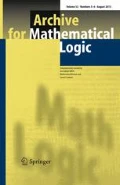Abstract
We introduce and study the first-order Generic Vopěnka’s Principle, which states that for every definable proper class of structures \(\mathcal {C}\) of the same type, there exist \(B\ne A\) in \(\mathcal {C}\) such that B elementarily embeds into A in some set-forcing extension. We show that, for \(n\ge 1\), the Generic Vopěnka’s Principle fragment for \(\Pi _n\)-definable classes is equiconsistent with a proper class of n-remarkable cardinals. The n-remarkable cardinals hierarchy for \(n\in \omega \), which we introduce here, is a natural generic analogue for the \(C^{(n)}\)-extendible cardinals that Bagaria used to calibrate the strength of the first-order Vopěnka’s Principle in Bagaria (Arch Math Logic 51(3–4):213–240, 2012). Expanding on the theme of studying set theoretic properties which assert the existence of elementary embeddings in some set-forcing extension, we introduce and study the weak Proper Forcing Axiom, \(\mathrm{wPFA}\). The axiom \(\mathrm{wPFA}\) states that for every transitive model \(\mathcal M\) in the language of set theory with some \(\omega _1\)-many additional relations, if it is forced by a proper forcing \(\mathbb P\) that \(\mathcal M\) satisfies some \(\Sigma _1\)-property, then V has a transitive model \(\bar{\mathcal M}\), satisfying the same \(\Sigma _1\)-property, and in some set-forcing extension there is an elementary embedding from \(\bar{\mathcal M}\) into \(\mathcal M\). This is a weakening of a formulation of \(\mathrm{PFA}\) due to Claverie and Schindler (J Symb Logic 77(2):475–498, 2012), which asserts that the embedding from \(\bar{\mathcal M}\) to \(\mathcal M\) exists in V. We show that \(\mathrm{wPFA}\) is equiconsistent with a remarkable cardinal. Furthermore, the axiom \(\mathrm{wPFA}\) implies \(\mathrm{PFA}_{\aleph _2}\), the Proper Forcing Axiom for antichains of size at most \(\omega _2\), but it is consistent with \(\square _\kappa \) for all \(\kappa \ge \omega _2\), and therefore does not imply \(\mathrm{PFA}_{\aleph _3}\).
Similar content being viewed by others
References
Bagaria, J.: \(C^{(n)}\)-cardinals. Arch. Math. Logic 51(3–4), 213–240 (2012)
Claverie, B., Schindler, R.: Woodin’s axiom \((\ast )\), bounded forcing axioms, and precipitous ideals on \(\omega _1\). J. Symb. Logic 77(2), 475–498 (2012)
Cheng, Y., Gitman, V.: Indestructibility properties of remarkable cardinals. Arch. Math. Logic 54(7), 961–984 (2015)
Cheng, Y., Schindler, R.: Harrington’s principle in higher order arithmetic. J. Symb. Logic 80(2), 477–489 (2015)
Gale, D., Stewart, F.M.: Infinite games with perfect information. Ann. Math. Stud. 28, 245–266 (1953)
Gitman, V., Schindler, R.: Virtual large cardinals. In preparation
Gitman, V., Welch, P.D.: Ramsey-like cardinals II. J. Symb. Logic 76(2), 541–560 (2011)
Hamkins, J.D.: The Vopěnka principle is inequivalent to but conservative over the Vopěnka scheme. Manuscript under review
Kunen, K.: Elementary embeddings and infinitary combinatorics. J. Symb. Logic 36, 407–413 (1971)
Magidor, M.: On the role of supercompact and extendible cardinals in logic. Isr. J. Math. 10, 147–157 (1971)
Schindler, R.D.: Proper forcing and remarkable cardinals. Bull. Symb. Logic 6(2), 176–184 (2000)
Schindler, R.: Remarkable cardinals. In: Infinity, Computability, and Metamathematics: Festschrift in honour of the 60th birthdays of Peter Koepke and Philip Welch, Series: Tributes. College Publications, London, GB (2014)
Schindler, R.: Set theory. Universitext. Springer, Cham (2014). Exploring independence and truth
Todorčević, S.: A note on the proper forcing axiom. In: Axiomatic Set Theory (Boulder, CO, 1983), vol. 31 of Contemp. Math., pp. 209–218. Am. Math. Soc., Providence, RI (1984)
Todorčević, S.: Localized reflection and fragments of PFA. In: Set Theory (Piscataway, NJ, 1999), vol. 58 of DIMACS Ser. Discrete Math. Theoret. Comput. Sci., pp. 135–148. Am. Math. Soc., Providence, RI (2002)
Author information
Authors and Affiliations
Corresponding author
Additional information
Parts of this research were done while all three authors were visiting fellows at the Isaac Newton Institute for Mathematical Sciences, Cambridge, UK, in the programme “Mathematical, Foundational and Computational Aspects of the Higher Infinite” (HIF) funded by EPSRC Grant EP/K032208/1 in September 2015. The first author would like to thank the support provided by a Simons Foundation fellowship while at the INI. Other parts of this research were done while the third author was visiting the School of Mathematics of the IPM, Tehran, Iran, in October 2015; he would like to thank his hosts for their exceptional hospitality. The research work of the first author was partially supported by the Spanish Government under Grant MTM2014-59178-P, and by the Generalitat de Catalunya (Catalan Government) under Grant SGR 437-2014.
Rights and permissions
About this article
Cite this article
Bagaria, J., Gitman, V. & Schindler, R. Generic Vopěnka’s Principle, remarkable cardinals, and the weak Proper Forcing Axiom. Arch. Math. Logic 56, 1–20 (2017). https://doi.org/10.1007/s00153-016-0511-x
Received:
Accepted:
Published:
Issue Date:
DOI: https://doi.org/10.1007/s00153-016-0511-x
Keywords
- Large cardinals
- Vopěnka’s Principle
- Generic Vopěnka’s Principle
- Remarkable cardinals
- Proper Forcing Axiom


